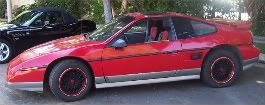I don't know why, but I seem to find that carburated cars are more reliable.
My Mitsubishi Pick Up has over 250k and my dad's car is over 200k. My uncle's old vettes. Our custodian's buick with a carb 3.8 has over 300k. Very little problem. And if there are problem, it's usually an easy fix. And the major problems that it may develop are sometimes not engine related.
With a computer, fuel injected car, I don't hear them going that high in mileage. Plus when they do have problems you have more issues with the sensors and what not.
Maybe my next car should be an older carb one.
My Mitsubishi Pick Up has over 250k and my dad's car is over 200k. My uncle's old vettes. Our custodian's buick with a carb 3.8 has over 300k. Very little problem. And if there are problem, it's usually an easy fix. And the major problems that it may develop are sometimes not engine related.
With a computer, fuel injected car, I don't hear them going that high in mileage. Plus when they do have problems you have more issues with the sensors and what not.
Maybe my next car should be an older carb one.










Comment